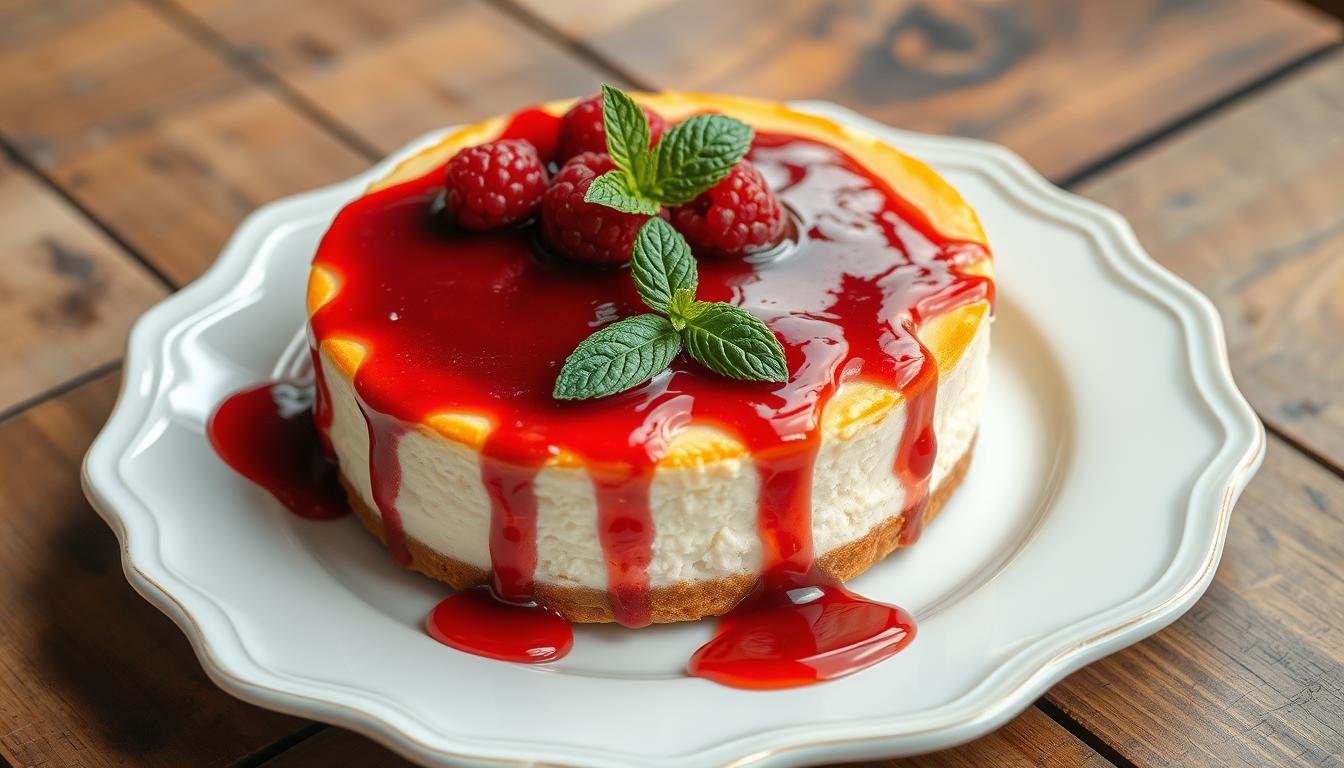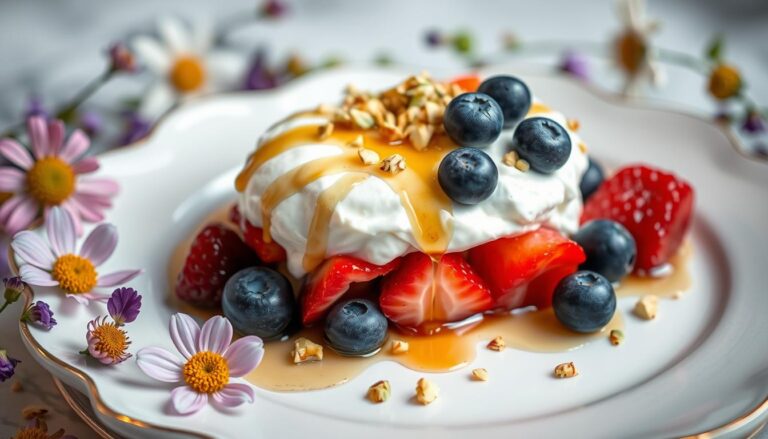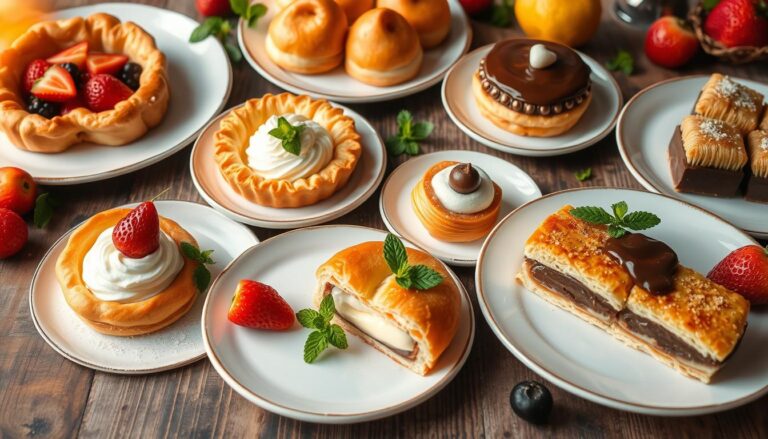Growing up in an Italian-American home, the smell of ricotta cheesecake was a sign of family time. The cheesecake’s creamy texture and the tang of ricotta were unforgettable. These flavors are part of my childhood.
Table of Contents
Now, I’m excited to share this classic ricotta cheesecake recipe with you. It’s a family tradition that brings Italy’s authentic flavors to your table.
Key Takeaways
- Authentic Italian recipe with a velvety smooth texture
- Features full-fat ricotta cheese, cream cheese, and a blend of classic ingredients
- Perfect for special occasions like New Year’s Eve and Mother’s Day
- Easy to prepare with a simple, straightforward method
- Versatile recipe that can be customized with various flavor additions
The Rich Heritage of Italian Ricotta Cheesecake
Italian ricotta cheesecake has a long history, dating back to ancient Rome. Over the years, families have shared their traditional ricotta cheesecake recipes for over 40 years. This shows how much it’s loved and valued in Italian culture.
Origins and Cultural Significance
In the Renaissance, authentic italian cheesecake became a staple in Italian cooking. It was first mentioned in Bartolomeo Scappi’s famous cookbook. These cakes were made with cheese, honey, fruits, and spices, just like the ancient Romans did.
This tradition has been kept alive in Italian celebrations, especially during Easter.
Traditional Family Recipe Evolution
Italian cheesecake is different from American cheesecakes. It uses fresh ricotta cheese, eggs, and egg yolks. It also includes special ingredients like shaved chocolate and candied fruits.
These recipes have been passed down through generations. They show the variety of traditional ricotta cheesecake recipes in Italy.
Regional Italian Variations
Each region in Italy has its own version of authentic italian cheesecake. In Liguria and Trentino, pine nuts and candied fruit are added. In Apulia, fresh figs or wild cherries are used.
These differences highlight the local flavors and traditions. They also show how italian cheesecake is deeply connected to Italy’s culture.
Essential Ingredients for Perfect Ricotta Cheesecake
Making an authentic Italian ricotta cheesecake needs the right mix of top-notch ingredients. At its core is the creamy, tangy ricotta cheese, making up 75% of the filling. To balance it, cream cheese is added, giving a smooth, rich texture.
Granulated sugar is the main sweetener, making up 25% of the filling. A bit of lemon juice and vanilla extract boost the flavors. Instead of a graham cracker crust, this recipe goes crustless. This lets the creamy ricotta filling shine.
| Ingredient | Quantity |
|---|---|
| Ricotta Cheese | 680g (75%) |
| Cream Cheese | 450g |
| Granulated Sugar | 300g (25%) |
| Lemon Juice | 1 tbsp |
| Vanilla Extract | 1 tbsp |
| Eggs | 6 |
| All-Purpose Flour | 53g |
| Sour Cream | 500mL |
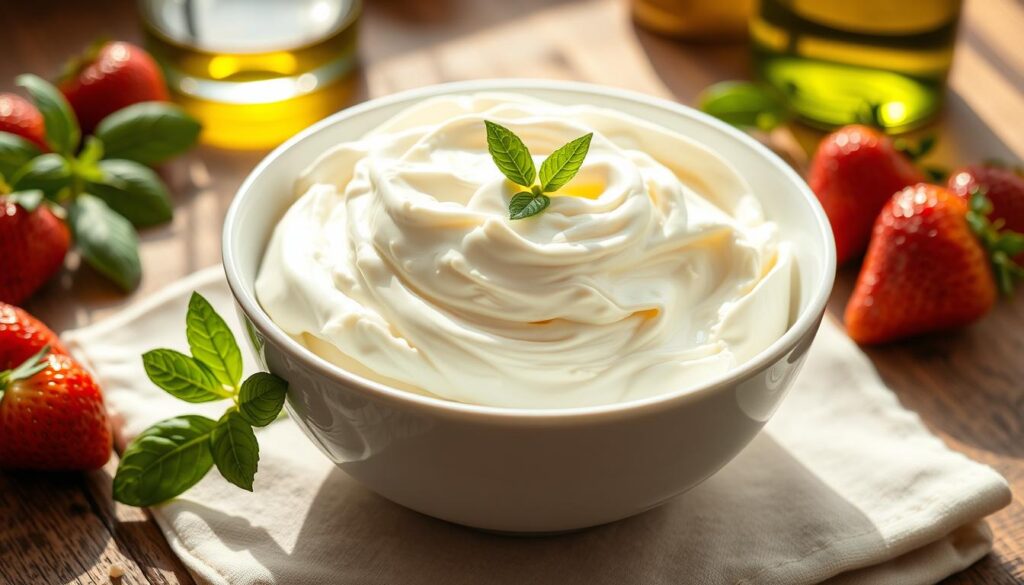
Every ingredient in this recipe is key to getting the perfect texture and taste for an authentic Italian ricotta cheesecake. The mix of ricotta cheese, cream cheese, and other special ingredients creates a rich, creamy, and indulgent dessert.
Understanding Ricotta Cheese Selection
Choosing the right ricotta is key to making a delicious Italian ricotta cheesecake. The quality of the ricotta can greatly affect the cheesecake’s texture and taste.
Full-Fat vs. Low-Fat Ricotta
Full-fat ricotta is best for a creamy cheesecake. It has more fat, making it richer and more flavorful. Low-fat ricotta is lighter but less indulgent.
Quality Indicators and Storage Tips
Good ricotta is creamy, moist, and slightly sweet. Stay away from dry, grainy, or sour ricotta. Keep it fresh by storing it in an airtight container in the fridge for up to 5 days.
Draining and Preparation Methods
Some ricottas need draining before use. Use a fine-mesh sieve or cheesecloth to remove excess liquid. This helps achieve a dense, creamy cheesecake.
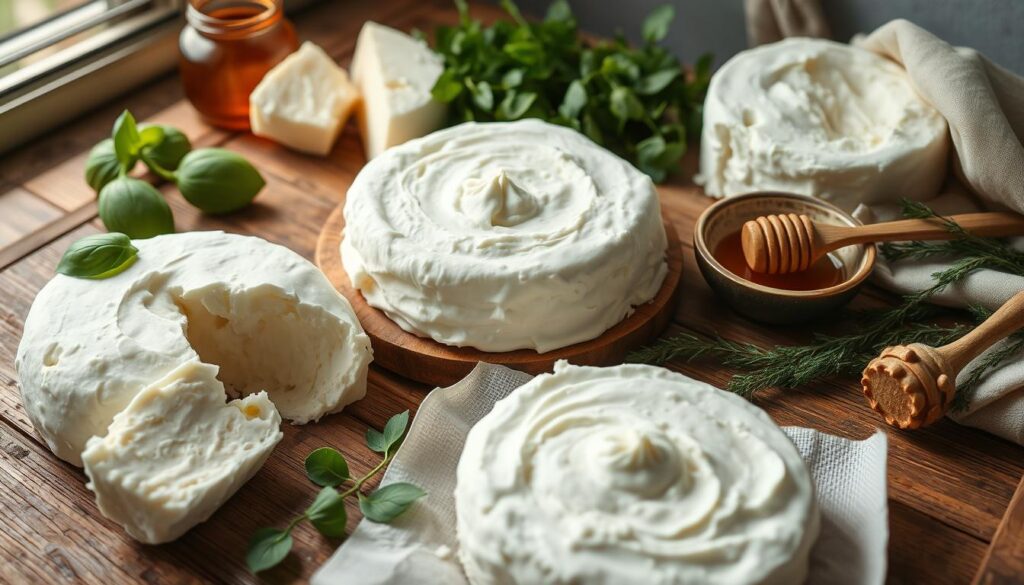
“Selecting high-quality ricotta is the foundation for an exceptional Italian ricotta cheesecake. The texture and flavor of the cheese will shine through in every bite.”
Classic Ricotta Cheesecake Step-by-Step Guide
Making a ricotta cheesecake recipe is a fun journey into Italian dessert traditions. This guide will help you make a classic baked cheesecake with homemade ricotta cake.
First, heat your oven to 350°F (175°C). Get a 10-inch springform pan ready. In a big bowl, mix the ricotta cheese until it’s smooth. Add the cream cheese, sugar, lemon juice, and vanilla extract. Mix until everything is well combined.
Then, add the eggs one at a time, mixing well after each. Fold in the flour and sour cream gently. Don’t overmix. Pour the mix into the pan and smooth the top.
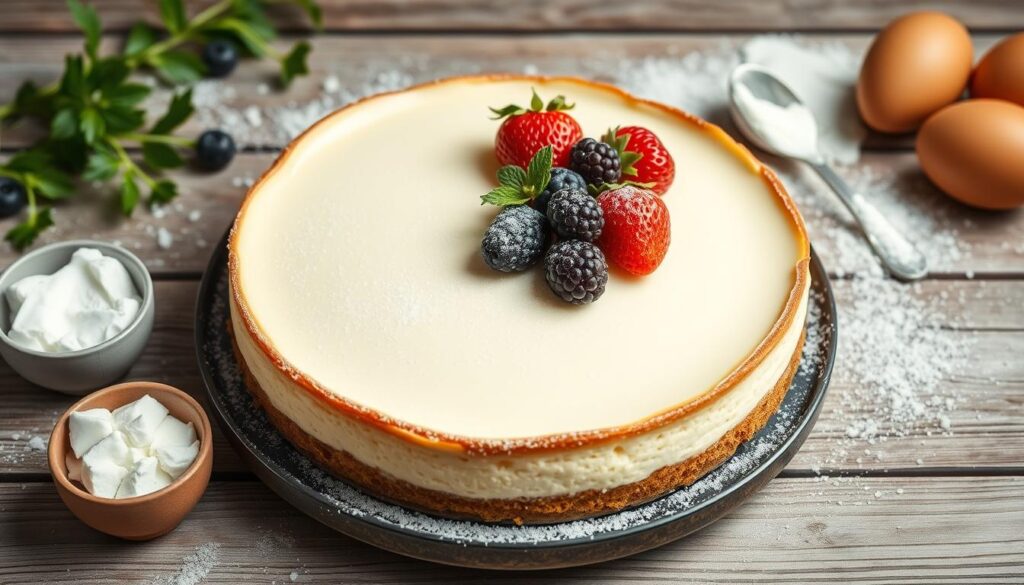
Bake for 50-60 minutes. The edges should be set, and the center a bit jiggly. Turn off the oven and let it cool slowly for an hour. This helps avoid cracks.
After cooling, cover the cheesecake and chill it for at least 6 hours, or better, overnight. This lets the flavors blend and the texture set.
Follow this guide to make a classic ricotta cheesecake that will wow everyone. Enjoy it as a special treat or a highlight for any occasion.
Mastering the Perfect Cheesecake Texture
Getting the right creamy ricotta filling and cheesecake texture is key to a delicious ricotta dessert recipe. It’s all about controlling the temperature and mixing right.
Temperature Control Techniques
Make sure all ingredients are at room temperature for a smooth batter. Let the cream cheese, eggs, and sour cream sit for 30 minutes. This keeps the mix smooth and creamy.
Mixing Methods for Optimal Results
- Start by beating the cream cheese until it’s fluffy, using a mixer on medium speed.
- Add sugar slowly, mixing well after each addition for a uniform texture.
- Add eggs one at a time, scraping the bowl to avoid over-mixing.
- Fold in sour cream, vanilla, and other flavors gently to keep the cheesecake texture right.
Achieving the Ideal Consistency
The cheesecake is ready when the edges are set but the center jiggles. This shows it’s perfectly balanced. Cooling it slowly in the oven helps avoid cracks and keeps it smooth.
| Ingredient | Quantity |
|---|---|
| Cream Cheese | 4 (8oz) blocks, full fat |
| Granulated Sugar | 1 1/2 cups (300g) |
| Cornstarch | 3 tbsp |
| Eggs | 4 large + 1 egg yolk |
| Lemon Juice | 2 tsp |
| Vanilla Extract | 2 tsp |
| Sour Cream | 1 cup (250g) |
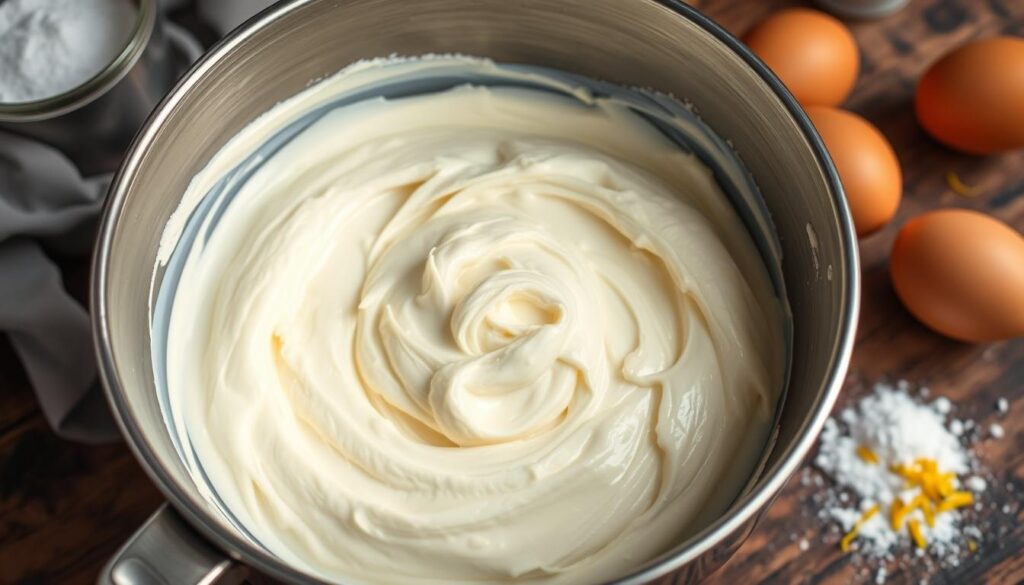
Baking Techniques and Timing Guidelines
Baking the perfect baked cheesecake is an art that needs focus. First, preheat your oven to 350°F (175°C). A ricotta cheesecake usually bakes for 50-60 minutes, but times can vary.
After baking, cooling is key. Let the cheesecake cool in the oven with the door ajar for 1-2 hours. This step prevents cracks and gives a smooth texture.
Once cooled, remove the cheesecake from the oven. Let it cool completely at room temperature. After it’s room temperature, refrigerate it overnight. This step lets the flavors mix and the texture set, making it a delicious dessert.
“Baking the perfect ricotta cheesecake is all about temperature control and patience. The gradual cooling process is crucial for achieving that coveted smooth, creamy texture.”
By following these baked cheesecake and cheesecake baking tips, your homemade ricotta cheesecake will be perfect. It will have a rich, authentic Italian taste.
Creative Flavor Variations and Toppings
The classic ricotta cheesecake is a versatile dessert. You can add many toppings and flavors. From fresh fruits to traditional Italian garnishes, there are endless ways to make it special.
Seasonal Fruit Combinations
Fresh fruits are great on ricotta cheesecake. In spring, try strawberries or raspberries and blackberries. For summer, use peaches or a mix of berries.
In fall, caramelized apples or spiced pear compote are perfect. These toppings change with the seasons, making the cheesecake fresh and exciting.
Traditional Italian Garnishes
For an authentic Italian touch, use classic toppings. Honey or powdered sugar add sweetness. Balsamic glaze or toasted almonds offer a bold contrast.
Roasted strawberries are a standout topping. They add a rich flavor that goes well with the creamy ricotta.
| Topping | Flavor Profile | Seasonal Pairing |
|---|---|---|
| Macerated Strawberries | Sweet, juicy | Spring |
| Raspberry and Blackberry Compote | Sweet-tart, vibrant | Spring/Summer |
| Peach Slices | Juicy, summery | Summer |
| Caramelized Apple Slices | Sweet, autumnal | Fall |
| Spiced Pear Compote | Sweet, warming | Fall |
| Honey Drizzle | Sweet, floral | Year-round |
| Powdered Sugar | Sweet, delicate | Year-round |
| Balsamic Glaze | Sweet-tart, complex | Year-round |
| Toasted Almonds | Nutty, crunchy | Year-round |
| Roasted Strawberries | Sweet, intense | Spring/Summer |
There are countless ways to make a classic ricotta cheesecake unique. Choose from seasonal fruits or traditional Italian garnishes. Either way, you’ll create a special italian dessert variation that will wow everyone.
Storage Tips and Serving Suggestions
Preserving the flavors of a classic ricotta cheesecake is key. It can be made up to 2 days in advance. This lets you plan ahead and enjoy its creamy goodness with ease.
To store your freshly baked ricotta cheesecake, wrap it tightly and refrigerate for up to 5 days. This keeps it moist and flavorful. It’s the perfect make-ahead treat for any occasion.
When serving your ricotta cheesecake, choose between chilled or room temperature. Both ways can enhance the experience. For a complete dessert, pair it with a refreshing espresso or a vibrant fruit salad. This lets the flavors intertwine and delight your guests.
| Storage Duration | Recommended Temperature | Serving Tips |
|---|---|---|
| Up to 2 days in advance | Refrigerated | Enjoy chilled or at room temperature |
| Leftover cheesecake for up to 5 days | Refrigerated | Pair with espresso or fruit salad |
| Freeze for up to 6 months | Frozen | Thaw overnight in the refrigerator before serving |
By following these simple storage and serving guidelines, your homemade ricotta cheesecake will be a delightful treat. It’s perfect for indulging yourself or sharing with loved ones.
Common Troubleshooting and Expert Tips
Making a perfect ricotta cheesecake can be tricky. But with the right tips, you can get that creamy texture every time. Let’s look at some common problems and expert advice to make your cheesecake troubleshooting journey a success.
Cracking is a common issue with cheesecakes. To avoid it, don’t overmix, especially when adding eggs. Too much mixing can cause cracks as it bakes and shrinks. Baking in a water bath can also help keep the temperature steady and prevent cracks.
Another problem is overbaking, which makes the cheesecake dry and dense. Keep an eye on it while it bakes. It’s ready when the edges are set but the center still wobbles a bit. Loosening the edges with a knife after baking can also help prevent cracks as it cools.
- Avoid overmixing, especially when adding eggs, to prevent cracks
- Bake in a water bath to regulate temperature and prevent cracking
- The cheesecake is done when the edges are set, but the center still jiggles slightly
- Gently loosen the edges with a knife after baking to prevent cracks as the cheesecake cools
By following these ricotta cheesecake tips and troubleshooting methods, you’ll get better at making perfect ricotta cheesecakes. Enjoy the process and feel free to try new flavors and toppings to make it your own.
Presentation and Special Occasion Serving
When serving a classic Italian ricotta cheesecake, presentation matters a lot, especially for special occasions. Adding thoughtful garnishes and plating techniques can make a simple dessert stand out.
Plating Techniques
For a fancy and appealing look, try these plating ideas:
- Dollop a small amount of freshly whipped cream or crème fraîche on the side of the cheesecake slice.
- Arrange a few seasonal berries, such as raspberries, blackberries, or sliced strawberries, around the cheesecake.
- Dust the top of the cheesecake with a light coating of powdered sugar for a touch of sweetness and visual interest.
- Drizzle a flavored sauce, like a dark chocolate or caramel sauce, around the plate for a sophisticated touch.
Seasonal Decorating Ideas
To celebrate the changing seasons, add festive decorations to your cheesecake presentation:
- For a Christmas special occasion dessert, adorn the cheesecake with fresh sprigs of holly, rosemary, or a dusting of crushed candy canes.
- In the spring, use edible flowers, such as violets or rose petals, for a beautiful and fragrant display.
- For a summer cheesecake, top it with a colorful arrangement of fresh berries or sliced citrus fruits.
- In the fall, add a sprinkle of ground cinnamon or nutmeg, or arrange sliced apples or pears around the cheesecake.
By using these simple yet impactful techniques, you can turn your classic ricotta cheesecake into a standout special occasion dessert. It will impress your guests and make any festive gathering more memorable.
Conclusion
This authentic italian cheesecake recipe brings a taste of Italy to your table. Its creamy texture and rich flavor make it great for any event. You can enjoy it plain or with toppings, making it a favorite in many homes.
The secret to this cheesecake’s success is using the right ricotta cheese and following the baking steps carefully. By doing so, you can make a cheesecake as good as those enjoyed in Italy. This recipe has been loved by Italian families for generations.
Enjoying a slice of this authentic italian cheesecake is more than just eating. It’s a way to celebrate Italian food culture. Whether it’s for dessert, a special treat, or a cozy moment, this classic ricotta cheesecake recipe will impress everyone.
FAQ
What makes this classic ricotta cheesecake recipe special?
What are the key ingredients in this ricotta cheesecake?
Why is the selection of ricotta cheese important for this recipe?
What are the key steps in baking the perfect ricotta cheesecake?
How can the classic ricotta cheesecake be customized?
How long can the ricotta cheesecake be stored, and how should it be served?
What are some common issues with baking ricotta cheesecake, and how can they be prevented?
Source Links
- https://www.shelovesbiscotti.com/italian-ricotta-cheesecake/
- https://vintagekitchennotes.com/orange-ricotta-cheesecake/
- https://bakerbynature.com/creamy-italian-ricotta-cheesecake-recipe/
- https://www.piattorecipes.com/italian-ricotta-cheesecake-recipe/
- https://thepiejournal.com/crostata-di-ricotta-the-italian-cheesecake-delight/
- https://miramarenaples.com/miramare-ristorantes-sweet-finale-new-york-ricotta-cheesecake/
- https://www.onceuponachef.com/recipes/ricotta-cheesecake.html
- https://healthyrecipesblogs.com/ricotta-cake/
- https://www.howtoeatthis.com/stream/how-do-you-eat-a-cheesecake/
- https://www.tastingtable.com/1490220/ricotta-cheese-recipes/
- https://www.simplyrecipes.com/migliaccio-recipe-8697817
- https://www.onceuponachef.com/recipes/new-york-style-cheesecake.html/comment-page-15
- https://www.yummytoddlerfood.com/mini-ricotta-cheesecake/
- https://www.wisconsincheese.com/recipes/3876/holiday-eggnog-cheesecake
- https://www.onceuponachef.com/recipes/new-york-style-cheesecake.html
- https://butternutbakeryblog.com/new-york-style-cheesecake/
- https://bakedbree.com/ricotta-cheesecake-recipe
- https://feelingfoodish.com/ricotta-cheesecake/
- https://mangiawithmichele.com/sicilian-cheesecake-with-ricotta/
- https://sugarandcharm.com/ricotta-cheesecake
- https://www.savoryexperiments.com/berry-ricotta-cake/
- https://www.tasteofhome.com/recipes/old-world-ricotta-cheesecake/?srsltid=AfmBOoobp5S8U5l3cJGA1fSkVYOTG3EZwAWwa3qvCSRS3M2wXv4ASEA2
- https://pastryteamusa.com/the-history-of-the-cheesecake/
- https://www.browneyedbaker.com/new-york-style-cheesecake-recipe/
- https://feelgoodfoodie.net/recipe/lemon-ricotta-cake/
- https://www.thisvivaciouslife.com/cannoli-cheesecake/
- https://cookerstyle.com/sicilian-ricotta-cheesecake-a-classic-italian-delight/
- https://biggyrecipes.com/ricotta-dessert-recipes-delicious-ideas-for-every-occasion/
- https://kitchenstasty.com/delicious-ricotta-dessert-recipes/

